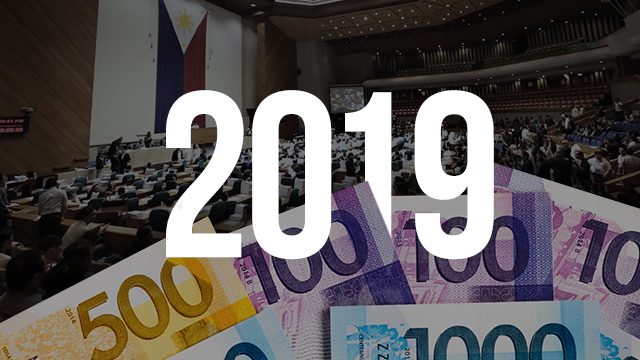SUMMARY
This is AI generated summarization, which may have errors. For context, always refer to the full article.

MANILA, Philippines (3rd UPDATE) – The House of Representatives is set to pass a joint resolution that would extend the validity of the current P3.757-trillion budget in 2019 until December 31, 2020.
On Tuesday, September 24, House Majority Leader Martin Romualdez said the lower chamber is prioritizing the swift passage of a joint resolution that would extend the life of funds allocated for the maintenance and other operating expenses and for capital outlay under the 2019 budget.
Romualdez said the House leadership wants to extend the 2019 budget’s validity following the months-long delay in its approval as well as the election ban that had barred the government from spending funds for new projects during the May elections.
This means that the validity of allocation under personnel services (such as staff salaries and allowances) will not be extended for another year, as it will be funded by the 2020 budget.
“We have to ensure that funding requirements of some important national projects under the 2019 GAA (General Appropriations Bill) will continue until next year. Without the extension, the unused funds will go back to the national treasury,” said Romualdez.
“This is the best option to address the delayed implementation of programs and projects for the delivery of basic services,” he added.
Multiple accusations of illegal budget insertions hounded the 2019 budget, causing a months-long delay in its passage and leading to the government reenacting the 2018 budget in the first quarter of 2019.
President Rodrigo Duterte was able to approve the 2019 budget only in April, but he made sure to veto the controversial multi-billion funds under Department of Public Works and Highways.
The government’s economic team said the delay in resolving the budget impasse in the first quarter of 2019 hurt the government’s poverty reduction efforts and kept around 420,000 Filipinos poor.
There are at least two joint resolutions filed in the House that seek to extend the shelf life of the 2019 budget: House Joint Resolution (HJR) No. 9, filed by Antique Representative Loren Legarda, and HJR 10, authored by San Juan City Representative Ronaldo Zamora and Davao Oriental 2nd District Representative Joel Almario.
Romualdez said the House committee on appropriations, chaired by Davao City 3rd District Representative Isidro Ungab, would tackle and consolidate the HJRs on Wednesday, September 25.
The two resolutions were consolidated under House Joint Resolution No. 19, which the House approved on second reading on Wednesday.
The House leadership aims to approve the consolidated HJR on second reading before the 18th Congress takes a month-long break by October 5.
“If the committee headed by Congressman Ungab will approve the twin joint resolutions, most likely we will consider its second reading approval before we adjourn next week,” said Romualdez.
The previous 17th Congress previously passed a joint resolution extending the validity of the P3.767-trillion budget for 2018 to December 31, 2019. Duterte approved this resolution.
On Wednesday, September 25, Budget Secretary Wendel Avisado clarified before the Senate finance panel that the implementation and payment for infrastructure projects are already extended until the end of 2020.
“MOOE payments can be done from March to June of next year, while infrastructure will still be effective December of next year…. But we will defer to the desire of Congress, if they so desire for the purposes of MOOE and capital outlay,” Avisado said.
In his veto message in April, President Rodrigo Duterte had already allowed the December 2020 deadline for the implementation and payment for infrastructure projects, provided that the funds are obligated not later than December 31, 2019. The same rule also covers subsidies to GOCCs for infrastructure projects. – with a report from Aika Rey/Rappler.com
Add a comment
How does this make you feel?
There are no comments yet. Add your comment to start the conversation.